(HRW/IFEX) – The following is a Human Rights Watch press release: Rwanda: Opposition Politician Shot, Others Detained Authorities Asked to Investigate (New York, January 9, 2002) — Rwandan authorities should immediately investigate the murder of Gratien Munyarubuga, a founder of the opposition Democratic Party for Renewal-Ubuyanja, and end harassment of other opposition and press figures, […]
(HRW/IFEX) – The following is a Human Rights Watch press release:
Rwanda: Opposition Politician Shot, Others Detained
Authorities Asked to Investigate
(New York, January 9, 2002) — Rwandan authorities should immediately investigate the murder of Gratien Munyarubuga, a founder of the opposition Democratic Party for Renewal-Ubuyanja, and end harassment of other opposition and press figures, Human Rights Watch said today.
Since the December 26 killing of Munyarubuga, authorities have detained and interrogated Pasteur Bizimungu, former president of Rwanda and the leading figure of the Ubuyanja party; another member of Ubuyanja; three persons associated with a faction of the Democratic Republican Movement (MDR) thought to be opposed to the current government; and a journalist who reported on these developments.
“The police should put their energies into prosecuting Munyarubuga’s killers rather than into intimidating people whose ideas they don’t like,” said Alison Des Forges, Senior Adviser to the Africa Division of Human Rights Watch.
Munyarubuga, a 66-year-old taxi driver, was shot by two men who had entered his taxi as passengers. Uniformed members of the Local Defense Force, an official police agency, reportedly stood by and failed to apprehend the killers. He was killed in the early afternoon in a wealthy neighborhood in the capital of Kigali. Munyarubuga had reportedly been threatened with death by police on December 10 when he visited Bizimungu at his home and on several subsequent occasions.
Police reportedly arrested Catherine Mujawamariya, also a founder of Ubuyanja, on December 10. They have also detained others who sought to visit Bizimungu or have prevented them from seeing him. Both Bizimungu and party spokesman, Charles Ntakirutinka, have been restricted from leaving the capital.
Authorities refused to allow Bizimungu to officially establish a new political party last June, and in late November prevented him from publishing a brief memoir. Bizimungu and his associates, who were attacked by street gangs several months ago, were again threatened recently. Others in opposition to the government, including former speaker of the National Assembly Joseph Sebarenzi, denounced these threats. Sebarenzi, now in exile in the United States, called for protection for Ubuyanja members in a Voice of America broadcast two days before Munyarubuga was murdered. A group called the Movement for Peace, Democracy and Development, said to be operating clandestinely inside Rwanda, detailed harassment of Ubuyanja members in a report circulated shortly after Munyarubuga’s death.
Authorities have also detained Pierre Gakwandi, recently elected secretary-general of one faction of the MDR party, and interrogated other MDR members, including former deputy Leonard Kavutse and a former ambassador.
From December 31 to January 3 police detained Amiel Nkuliza, journalist of Le Partisan newspaper, questioning him about his reports of Munyarubuga’s killing and about the MDR party. When first detained, he was reportedly forced to telephone friends to reassure them so that they would not seek to locate him.
“If authorities have reason to suspect all these people have committed some crime, they should charge them. Otherwise they should allow them the freedom of opinion and expression guaranteed by Rwandan and international law,” said Des Forges.


